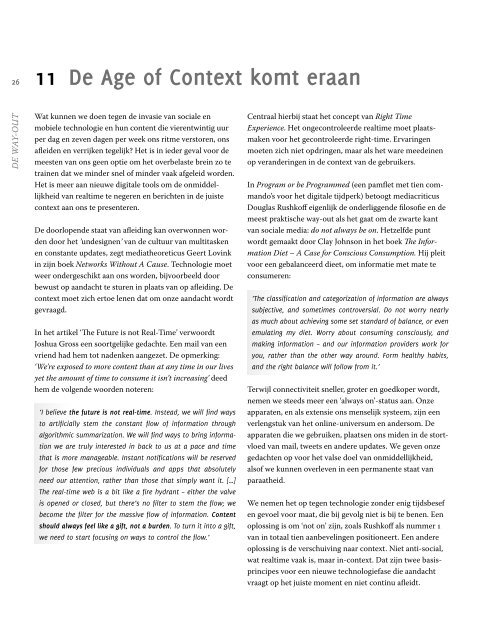Create successful ePaper yourself
Turn your PDF publications into a flip-book with our unique Google optimized e-Paper software.
26<br />
DE WAY-OUT<br />
11 <strong>De</strong> Age of Context komt eraan<br />
Wat kunnen we doen tegen de invasie <strong>van</strong> <strong>sociale</strong> en<br />
mobiele technologie en hun content die vierentwintig uur<br />
per dag en zeven dagen per week ons ritme verstoren, ons<br />
afleiden en verrijken tegelijk? Het is in ieder geval voor de<br />
meesten <strong>van</strong> ons geen optie om het overbelaste brein zo te<br />
trainen dat we minder snel of minder vaak afgeleid worden.<br />
Het is meer aan nieuwe digitale tools om de onmiddellijkheid<br />
<strong>van</strong> realtime te negeren en berichten in de juiste<br />
context aan ons te presenteren.<br />
<strong>De</strong> doorlopende staat <strong>van</strong> afleiding kan overwonnen worden<br />
door het ’undesignen’ <strong>van</strong> de cultuur <strong>van</strong> multitasken<br />
en constante updates, zegt <strong>media</strong>theoreticus Geert Lovink<br />
in zijn boek Networks Without A Cause. Technologie moet<br />
weer ondergeschikt aan ons worden, bijvoorbeeld door<br />
bewust op aandacht te sturen in plaats <strong>van</strong> op afleiding. <strong>De</strong><br />
context moet zich ertoe lenen dat om onze aandacht wordt<br />
gevraagd.<br />
In het artikel ‘The Future is not Real-Time’ verwoordt<br />
Joshua Gross een soortgelijke gedachte. Een mail <strong>van</strong> een<br />
vriend had hem tot nadenken aangezet. <strong>De</strong> opmerking:<br />
‘We’re exposed to more content than at any time in our lives<br />
yet the amount of time to consume it isn’t increasing’ deed<br />
hem de volgende woorden noteren:<br />
‘I believe the future is not real-time. Instead, we will find ways<br />
to artificially stem the constant flow of information through<br />
algorithmic summarization. We will find ways to bring information<br />
we are truly interested in back to us at a pace and time<br />
that is more manageable. Instant notifications will be reserved<br />
for those few precious individuals and apps that absolutely<br />
need our attention, rather than those that simply want it. […]<br />
The real-time web is a bit like a fire hydrant – either the valve<br />
is opened or closed, but there’s no filter to stem the flow; we<br />
become the filter for the massive flow of information. Content<br />
should always feel like a gift, not a burden. To turn it into a gift,<br />
we need to start focusing on ways to control the flow.’<br />
Centraal hierbij staat het concept <strong>van</strong> Right Time<br />
Experience. Het ongecontroleerde realtime moet plaatsmaken<br />
voor het gecontroleerde right-time. Ervaringen<br />
moeten zich niet opdringen, maar als het ware meedeinen<br />
op veranderingen in de context <strong>van</strong> de gebruikers.<br />
In Program or be Programmed (een pamflet met tien commando’s<br />
voor het digitale tijdperk) betoogt <strong>media</strong>criticus<br />
Douglas Rushkoff eigenlijk de onderliggende filosofie en de<br />
meest praktische way-out als het gaat om de <strong>zwarte</strong> <strong>kant</strong><br />
<strong>van</strong> <strong>sociale</strong> <strong>media</strong>: do not always be on. Hetzelfde punt<br />
wordt gemaakt door Clay Johnson in het boek The Information<br />
Diet – A Case for Conscious Consumption. Hij pleit<br />
voor een gebalanceerd dieet, om informatie met mate te<br />
consumeren:<br />
‘The classification and categorization of information are always<br />
subjective, and sometimes controversial. Do not worry nearly<br />
as much about achieving some set standard of balance, or even<br />
emulating my diet. Worry about consuming consciously, and<br />
making information – and our information providers work for<br />
you, rather than the other way around. Form healthy habits,<br />
and the right balance will follow from it.’<br />
Terwijl connectiviteit sneller, groter en goedkoper wordt,<br />
nemen we steeds meer een ‘always on’-status aan. Onze<br />
apparaten, en als extensie ons menselijk systeem, zijn een<br />
verlengstuk <strong>van</strong> het online-universum en andersom. <strong>De</strong><br />
apparaten die we gebruiken, plaatsen ons miden in de stortvloed<br />
<strong>van</strong> mail, tweets en andere updates. We geven onze<br />
gedachten op voor het valse doel <strong>van</strong> onmiddellijkheid,<br />
alsof we kunnen overleven in een permanente staat <strong>van</strong><br />
paraatheid.<br />
We nemen het op tegen technologie zonder enig tijdsbesef<br />
en gevoel voor maat, die bij gevolg niet is bij te benen. Een<br />
oplossing is om ‘not on’ zijn, zoals Rushkoff als nummer 1<br />
<strong>van</strong> in totaal tien aanbevelingen positioneert. Een andere<br />
oplossing is de verschuiving naar context. Niet anti-social,<br />
wat realtime vaak is, maar in-context. Dat zijn twee basisprincipes<br />
voor een nieuwe technologiefase die aandacht<br />
vraagt op het juiste moment en niet continu afleidt.


